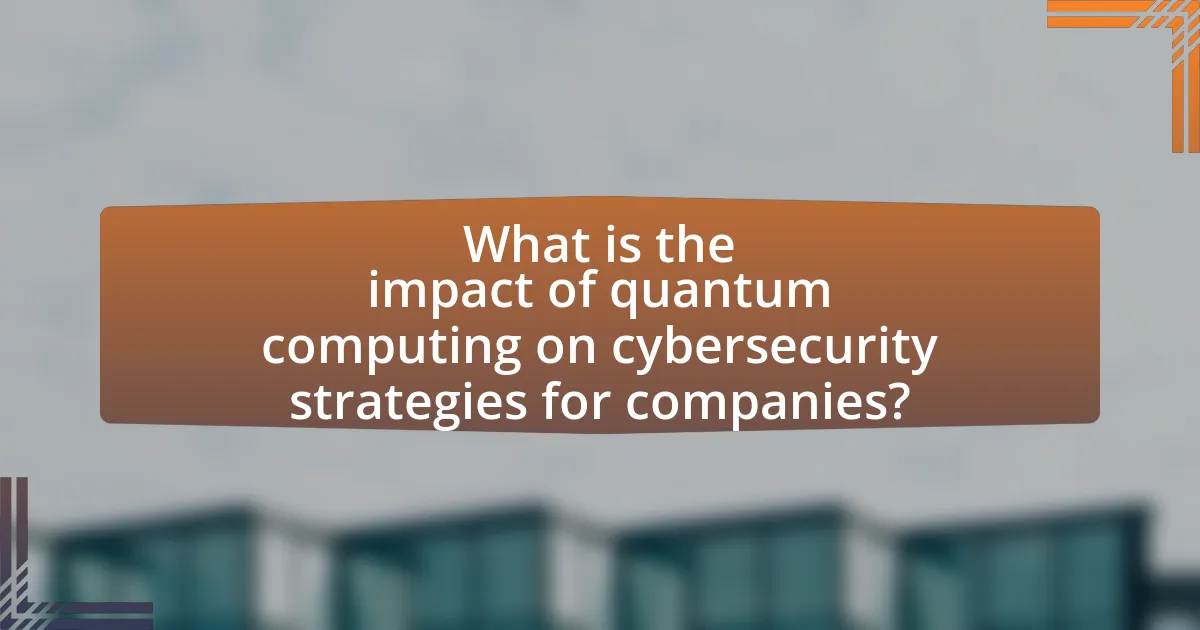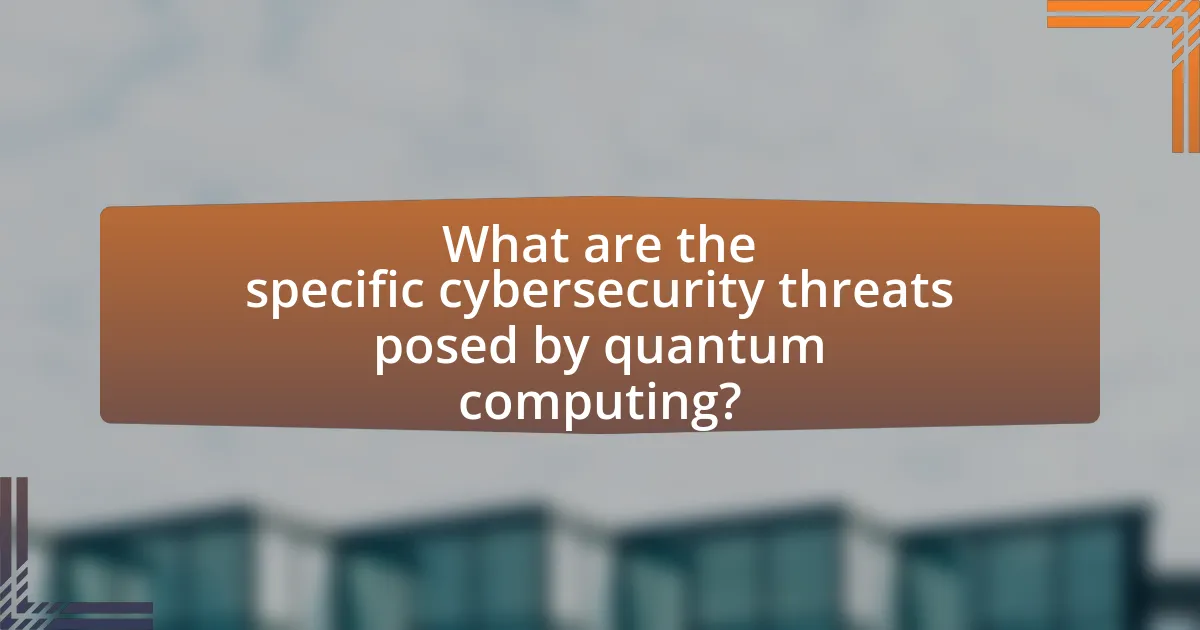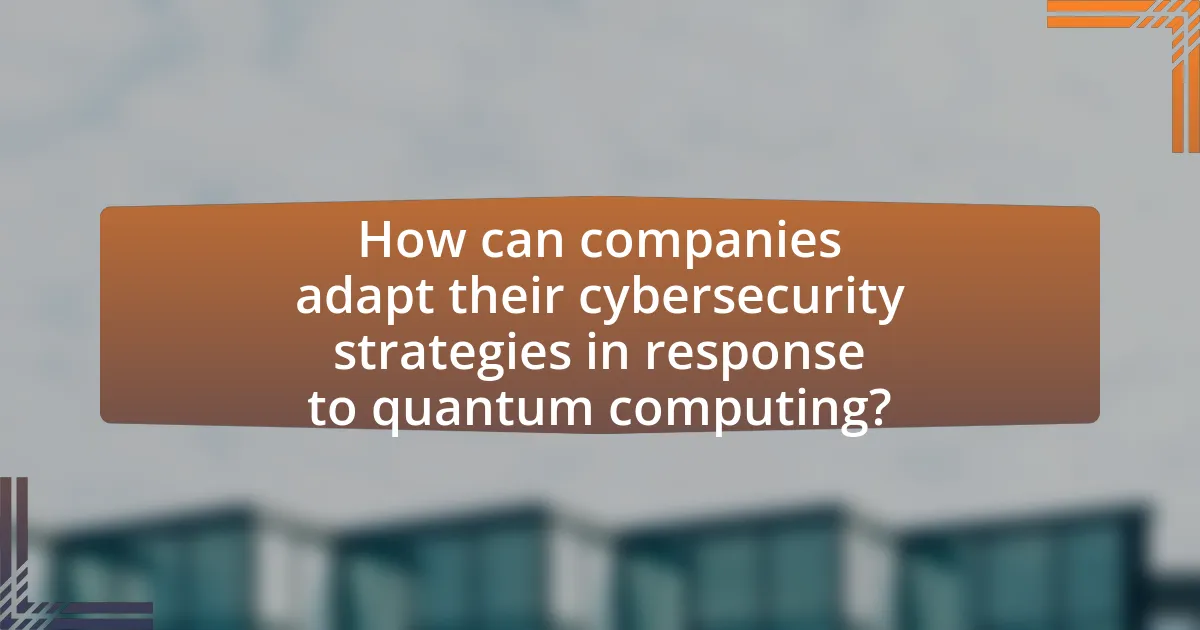The article examines the significant impact of quantum computing on cybersecurity strategies for companies, highlighting the threats posed to traditional encryption methods such as RSA and ECC. It discusses how quantum computers can efficiently solve complex mathematical problems, rendering current cryptographic systems vulnerable and necessitating the development of quantum-resistant algorithms. Key principles of quantum computing, including superposition and entanglement, are explored in relation to their implications for data privacy and protection. The article emphasizes the importance of proactive measures, such as risk assessments and employee training, to prepare for the transition to quantum-safe cybersecurity practices.

What is the impact of quantum computing on cybersecurity strategies for companies?
Quantum computing significantly impacts cybersecurity strategies for companies by threatening traditional encryption methods. As quantum computers can potentially solve complex mathematical problems, such as factoring large integers, much faster than classical computers, they pose a risk to widely used encryption algorithms like RSA and ECC. Research indicates that a sufficiently powerful quantum computer could break these encryption schemes in a matter of hours, undermining the security of sensitive data and communications. Consequently, companies must adapt their cybersecurity strategies by transitioning to quantum-resistant algorithms and enhancing their overall security frameworks to mitigate these emerging threats.
How does quantum computing differ from classical computing in the context of cybersecurity?
Quantum computing fundamentally differs from classical computing in cybersecurity by utilizing quantum bits (qubits) that can exist in multiple states simultaneously, enabling vastly superior processing power for certain tasks. This capability allows quantum computers to potentially break widely used encryption algorithms, such as RSA and ECC, which rely on the difficulty of factoring large numbers or solving discrete logarithms. For instance, Shor’s algorithm, designed for quantum computers, can factor large integers exponentially faster than the best-known classical algorithms, posing a significant threat to current cryptographic systems. As a result, the advent of quantum computing necessitates the development of quantum-resistant cryptographic methods to safeguard sensitive data against future quantum attacks.
What are the fundamental principles of quantum computing that affect cybersecurity?
The fundamental principles of quantum computing that affect cybersecurity include superposition, entanglement, and quantum measurement. Superposition allows quantum bits (qubits) to exist in multiple states simultaneously, which can enable faster processing of complex algorithms, potentially breaking traditional encryption methods like RSA and ECC. Entanglement creates a correlation between qubits, meaning the state of one qubit can depend on the state of another, regardless of distance, which can be exploited for secure communication protocols like quantum key distribution (QKD). Quantum measurement collapses the superposition of qubits into a definite state, which can be used to detect eavesdropping in quantum communications, enhancing security. These principles indicate that quantum computing could render many current cybersecurity measures obsolete, necessitating the development of quantum-resistant algorithms to safeguard sensitive information.
How does quantum computing challenge traditional encryption methods?
Quantum computing challenges traditional encryption methods by leveraging quantum algorithms that can efficiently solve problems deemed intractable for classical computers. For instance, Shor’s algorithm enables quantum computers to factor large integers exponentially faster than the best-known classical algorithms, threatening widely used encryption schemes like RSA, which rely on the difficulty of this factorization. As a result, the security of sensitive data protected by traditional encryption methods is at risk, necessitating the development of quantum-resistant algorithms to safeguard information in a post-quantum world.
Why is it important for companies to understand the implications of quantum computing on cybersecurity?
It is important for companies to understand the implications of quantum computing on cybersecurity because quantum computers have the potential to break traditional encryption methods, which are foundational to current cybersecurity practices. As quantum technology advances, it could render widely used algorithms, such as RSA and ECC, vulnerable to attacks, compromising sensitive data and communications. For instance, a 2019 report by the National Institute of Standards and Technology (NIST) highlighted that quantum computers could solve certain mathematical problems exponentially faster than classical computers, emphasizing the urgency for companies to adopt quantum-resistant encryption solutions. Understanding these implications enables companies to proactively enhance their cybersecurity frameworks, ensuring data integrity and protection against future threats.
What potential risks do companies face from quantum computing advancements?
Companies face significant risks from quantum computing advancements, primarily due to the potential for quantum computers to break traditional encryption methods. Current cryptographic systems, such as RSA and ECC, rely on the difficulty of factoring large numbers and solving discrete logarithm problems, which quantum algorithms like Shor’s algorithm can efficiently solve. This capability poses a threat to sensitive data protection, as quantum computers could decrypt confidential information, leading to data breaches and loss of intellectual property. Additionally, the transition to quantum-resistant algorithms is complex and may introduce vulnerabilities during the implementation phase, further exposing companies to cyber threats.
How can companies prepare for the transition to quantum-safe cybersecurity measures?
Companies can prepare for the transition to quantum-safe cybersecurity measures by conducting a comprehensive risk assessment to identify vulnerabilities in their current systems. This assessment should include evaluating existing cryptographic protocols against potential quantum threats, as quantum computers can break widely used encryption methods like RSA and ECC.
To address these vulnerabilities, companies should invest in research and development of quantum-resistant algorithms, such as those being standardized by the National Institute of Standards and Technology (NIST). Implementing pilot programs to test these new algorithms in real-world scenarios will help organizations understand their effectiveness and integration challenges.
Additionally, companies should engage in continuous education and training for their cybersecurity teams to stay updated on advancements in quantum computing and cryptography. Collaborating with industry groups and participating in forums focused on quantum-safe practices can also provide valuable insights and resources.
By taking these proactive steps, companies can significantly enhance their cybersecurity posture in anticipation of the quantum computing era.

What are the specific cybersecurity threats posed by quantum computing?
Quantum computing poses specific cybersecurity threats primarily through its ability to break widely used cryptographic algorithms. Quantum computers can efficiently solve problems that classical computers struggle with, such as factoring large integers and computing discrete logarithms, which underpins the security of RSA and ECC encryption methods. For instance, Shor’s algorithm enables a quantum computer to factor a 2048-bit RSA key in polynomial time, rendering current encryption methods vulnerable. This capability threatens the confidentiality and integrity of sensitive data, as quantum computers could decrypt information that was previously secure. Additionally, quantum computing introduces risks related to quantum key distribution, where the security of keys may be compromised if quantum systems are not properly implemented.
How can quantum computing break current encryption algorithms?
Quantum computing can break current encryption algorithms by leveraging quantum algorithms, such as Shor’s algorithm, which can efficiently factor large integers and compute discrete logarithms. Traditional encryption methods, like RSA and ECC, rely on the computational difficulty of these problems for security. For instance, RSA encryption, which secures data by using the product of two large prime numbers, becomes vulnerable because Shor’s algorithm can factor these numbers in polynomial time, significantly faster than classical algorithms. This capability poses a substantial threat to data security, as it could allow unauthorized access to encrypted information that is currently considered secure.
What are the most vulnerable encryption standards in the face of quantum computing?
The most vulnerable encryption standards in the face of quantum computing are RSA, DSA, and ECC. These encryption methods rely on mathematical problems that quantum computers can solve efficiently using algorithms like Shor’s algorithm, which can factor large integers and compute discrete logarithms in polynomial time. For instance, RSA’s security is based on the difficulty of factoring the product of two large prime numbers, a task that becomes feasible for quantum computers, rendering RSA insecure. Similarly, ECC, which relies on the difficulty of the elliptic curve discrete logarithm problem, is also at risk as quantum algorithms can break it. This vulnerability poses significant risks to data security and necessitates the transition to quantum-resistant encryption standards.
How does the timeline for quantum computing development affect cybersecurity planning?
The timeline for quantum computing development significantly impacts cybersecurity planning by necessitating proactive measures to safeguard against potential threats posed by quantum algorithms. As quantum computers advance, they will be capable of breaking widely used encryption methods, such as RSA and ECC, which currently secure sensitive data. For instance, the National Institute of Standards and Technology (NIST) has been working on post-quantum cryptography standards to prepare for this eventuality, indicating a recognized urgency in adapting cybersecurity frameworks. Companies must therefore prioritize the integration of quantum-resistant algorithms into their security protocols to mitigate risks associated with quantum decryption capabilities that could emerge within the next decade.
What are the implications of quantum computing for data privacy and protection?
Quantum computing poses significant risks to data privacy and protection by potentially breaking traditional encryption methods. Current encryption algorithms, such as RSA and ECC, rely on the difficulty of factoring large numbers or solving discrete logarithm problems, which quantum computers can solve efficiently using algorithms like Shor’s algorithm. This capability threatens the confidentiality of sensitive data, as quantum computers could decrypt information that is currently secure. For instance, a sufficiently powerful quantum computer could compromise encrypted communications and stored data, leading to unauthorized access and data breaches. As a result, organizations must adapt their cybersecurity strategies to incorporate quantum-resistant encryption methods to safeguard data privacy and protection against future quantum threats.
How does quantum computing impact the confidentiality of sensitive information?
Quantum computing significantly threatens the confidentiality of sensitive information by enabling the potential to break widely used encryption methods. Traditional encryption algorithms, such as RSA and ECC, rely on the difficulty of factoring large numbers or solving discrete logarithm problems, which quantum computers can solve efficiently using algorithms like Shor’s algorithm. This capability means that sensitive data protected by these encryption methods could be decrypted in a fraction of the time it currently takes with classical computers, thereby exposing confidential information to unauthorized access. As a result, organizations must adapt their cybersecurity strategies to incorporate quantum-resistant encryption methods to safeguard sensitive information against future quantum threats.
What measures can companies take to safeguard data against quantum threats?
Companies can safeguard data against quantum threats by implementing quantum-resistant cryptographic algorithms. These algorithms, such as lattice-based, hash-based, and multivariate polynomial cryptography, are designed to withstand the computational power of quantum computers, which can break traditional encryption methods like RSA and ECC. The National Institute of Standards and Technology (NIST) is actively working on standardizing post-quantum cryptography, providing a framework for organizations to adopt these new algorithms. By transitioning to quantum-resistant encryption, companies can protect sensitive information from potential future quantum attacks, ensuring data integrity and confidentiality.

How can companies adapt their cybersecurity strategies in response to quantum computing?
Companies can adapt their cybersecurity strategies in response to quantum computing by implementing quantum-resistant cryptographic algorithms. As quantum computers possess the capability to break traditional encryption methods, such as RSA and ECC, organizations must transition to post-quantum cryptography standards that are designed to withstand quantum attacks. The National Institute of Standards and Technology (NIST) is actively working on standardizing these algorithms, with the first set of post-quantum cryptographic standards expected to be finalized by 2024. By adopting these new standards, companies can enhance their data security and ensure the integrity of their communications in a future where quantum computing is prevalent.
What are the best practices for implementing quantum-resistant encryption?
The best practices for implementing quantum-resistant encryption include selecting algorithms that are specifically designed to withstand quantum attacks, such as lattice-based, hash-based, or code-based cryptographic systems. These algorithms have been identified by the National Institute of Standards and Technology (NIST) as candidates for post-quantum cryptography, demonstrating their potential effectiveness against quantum computing threats.
Additionally, organizations should conduct thorough risk assessments to identify critical data and systems that require quantum-resistant encryption, ensuring that the chosen algorithms are integrated into existing security protocols. Regular updates and patches to cryptographic systems are essential to maintain security as new vulnerabilities are discovered.
Furthermore, organizations should engage in continuous monitoring of advancements in quantum computing and cryptography to adapt their strategies accordingly, ensuring long-term resilience against evolving threats.
Which quantum-resistant algorithms should companies consider adopting?
Companies should consider adopting lattice-based algorithms, hash-based signatures, and code-based cryptography as quantum-resistant algorithms. Lattice-based algorithms, such as NTRU and Learning With Errors (LWE), are believed to be secure against quantum attacks due to their mathematical complexity. Hash-based signatures, like XMSS (eXtended Merkle Signature Scheme), provide security by relying on the one-way nature of hash functions, which remain robust against quantum decryption methods. Code-based cryptography, exemplified by McEliece, utilizes error-correcting codes to secure data, making it resistant to quantum algorithms like Shor’s. These algorithms are being actively researched and standardized by organizations such as the National Institute of Standards and Technology (NIST), which is in the process of selecting quantum-resistant cryptographic standards.
How can companies assess their current cybersecurity posture in light of quantum threats?
Companies can assess their current cybersecurity posture in light of quantum threats by conducting a comprehensive risk assessment that evaluates their existing encryption methods and data protection strategies against potential vulnerabilities introduced by quantum computing. This assessment should include identifying critical assets, analyzing the effectiveness of current cryptographic algorithms, and determining the potential impact of quantum attacks on sensitive data.
For instance, traditional encryption methods like RSA and ECC are susceptible to quantum algorithms such as Shor’s algorithm, which can efficiently factor large integers and solve discrete logarithms, rendering these methods insecure. By utilizing frameworks like the NIST Post-Quantum Cryptography Standardization process, companies can benchmark their systems against emerging quantum-resistant algorithms.
Additionally, organizations should engage in regular penetration testing and simulations of quantum attacks to evaluate their defenses and readiness. This proactive approach enables companies to identify weaknesses and adapt their cybersecurity strategies accordingly, ensuring resilience against the evolving landscape of quantum threats.
What role does employee training play in adapting to quantum computing challenges?
Employee training is crucial for adapting to quantum computing challenges as it equips personnel with the necessary skills and knowledge to understand and mitigate the unique cybersecurity risks posed by quantum technologies. As quantum computing can potentially break traditional encryption methods, training programs focused on quantum-safe cryptography and secure coding practices are essential. Research indicates that organizations investing in employee training on quantum computing can enhance their cybersecurity posture, as evidenced by a study from the National Institute of Standards and Technology, which emphasizes the importance of workforce readiness in the face of emerging technologies. This proactive approach ensures that employees can effectively respond to and manage the complexities introduced by quantum computing in cybersecurity strategies.
How can companies educate their workforce about quantum computing and cybersecurity?
Companies can educate their workforce about quantum computing and cybersecurity through structured training programs, workshops, and online courses. These educational initiatives should focus on the fundamental principles of quantum computing, its implications for cybersecurity, and the potential risks and benefits associated with quantum technologies. For instance, organizations can partner with universities or specialized training providers to deliver content that is both relevant and up-to-date, ensuring employees understand how quantum computing could disrupt current encryption methods. Research indicates that 80% of organizations believe that employee training is crucial for adapting to technological changes, highlighting the importance of continuous education in this rapidly evolving field.
What resources are available for companies to enhance their cybersecurity knowledge regarding quantum computing?
Companies can enhance their cybersecurity knowledge regarding quantum computing through various resources, including academic research papers, industry reports, online courses, and specialized workshops. For instance, the National Institute of Standards and Technology (NIST) provides guidelines and publications on post-quantum cryptography, which are essential for understanding the implications of quantum computing on cybersecurity. Additionally, organizations like the Quantum Economic Development Consortium (QED-C) offer resources and networking opportunities to stay updated on quantum technologies. Online platforms such as Coursera and edX feature courses on quantum computing and its cybersecurity implications, enabling professionals to gain relevant skills. These resources collectively support companies in navigating the evolving landscape of cybersecurity in the context of quantum advancements.
What practical steps can companies take to ensure robust cybersecurity in a quantum computing era?
Companies can ensure robust cybersecurity in a quantum computing era by adopting quantum-resistant cryptographic algorithms. These algorithms, such as lattice-based, hash-based, and code-based cryptography, are designed to withstand the potential threats posed by quantum computers, which can break traditional encryption methods like RSA and ECC.
For instance, the National Institute of Standards and Technology (NIST) is actively working on standardizing post-quantum cryptography, with several algorithms already selected for further evaluation. Companies should begin transitioning to these quantum-resistant algorithms to protect sensitive data and communications.
Additionally, organizations should conduct regular risk assessments to identify vulnerabilities in their current systems and implement multi-layered security strategies that include encryption, access controls, and continuous monitoring. By staying informed about advancements in quantum computing and cybersecurity, companies can proactively adapt their security measures to mitigate risks associated with this emerging technology.
